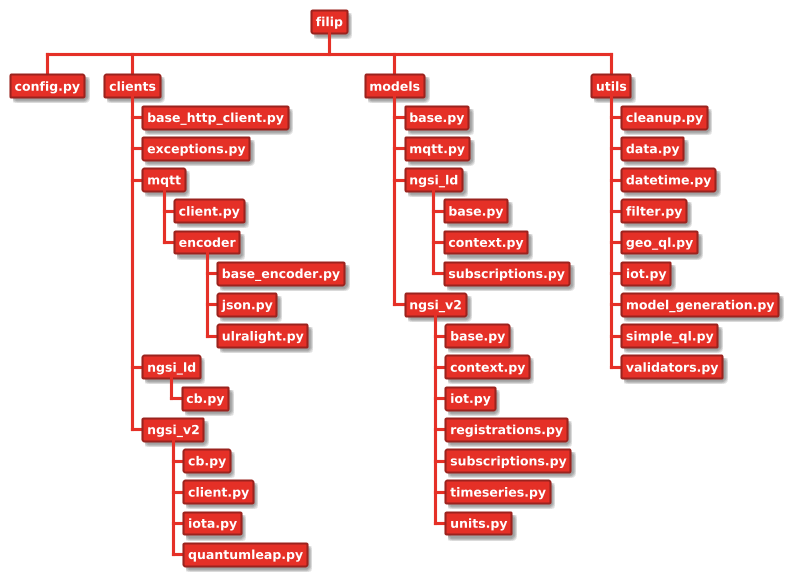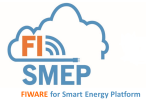[FI]WARE [Li]brary for [P]ython
Project description
FiLiP
FiLiP (Fiware Library for Python) is a python software development kit (SDK) for accelerating the development of web services that use Fiware's Generic Enablers (GEs) as backend.
Is it mainly based on the Pydantic package which is sophisticated library for data validation and settings management using python type annotations. Pydantic enforces type hints at runtime, and provides user friendly errors when data is invalid. We mainly use Pydantic model to build our own data model structure required for efficient data model parsing and validation and interaction with FIWARE services' RestAPIs.
For API interaction FiLiP relies on the well-known requests package. It is important to understand that we do not in any way restrict any features of requests.
Furthermore, FiLiP is designed to help with fast development of FIWARE based application and avoid hundreds of lines of boilerplate, but it cannot substitute to learn the basic concepts behind the used FIWARE components.
General Motivation
Why implement a client library when clients can be auto-generated from openapi documentation? A general prerequisite to do so is that the documentation is in depth and of good quality. While FIWARE generally provides openapi documentation, here are some thoughts on the challenges of auto-generating client code from these documents:
- Auto-generated code tends to become rather bulky and its quality strongly depends on the provided input data.
- Manipulating generated code can result in a big hassle for maintenance if additional features need to be integrated.
- The underlying NGSI (Next Generation Service Interface) for FIWARE is a rather generic specification. Hence, generated models may also be of generic types as lists and dicts in Python. So there is no real benefit. Furthermore, there is no chance for reasonable validation and error handling.
Getting started
The following section shortly describes how to use the library.
Prerequisites
Since FiLiP is designed as a client library, it requires a server that provides the target Service-APIs. Hence, if you do not yet have a running instance of a FIWARE based platform, using docker is the most convenient way to set it up. Please check here for a tutorial on this. If this is not an option for you, FIWARE also provides a testing server. You can register for a testing account here.
Installation
The easiest way to install the library is via pip:
pip install -U filip
If you want to benefit from the latest changes, use the following command (This will install the current master branch from this repository):
pip install -U git+git://github.com/RWTH-EBC/filip
Introduction to FIWARE
The following section introduces FIWARE. If you are already familiar with FIWARE, you can skip this section and go straight to Getting Started.
What is FIWARE?
FIWARE is a framework of open-source cloud platform components, created to facilitate the development of smart solutions within various application domains. At the moment, the FIWARE catalogue contains over 30 interoperable software modules, so-called Generic Enablers (GE) for developing and providing customized IoT platform solutions.
To get familiar with the APIs of the different modules we highly recommend checking the step-by-step tutorial. It provides a good overview on FIWARE and its basic usage. Whereas the tutorial helps to understand most of the general concepts, for a deep dive, where you can learn about the components in more detail, FIWARE also offers extended lessons through their academy.
However, usually one only requires a small set of components. Hence, we recommend using the cited pages only as needed.
How to set up a FIWARE platform?
The easiest way to set up a FIWARE platform is by using docker as all GEs are open-source and distributed as docker containers on dockerhub.
However, as mentioned before, for most use cases only a subset of GEs is required. Hence, we wrote a small tutorial explaining how to set up a platform suited for most use cases within the energy domain.
FIWARE GEs covered by FiLiP
FiLiP is a library developed on demand. Hence, we do not aim to cover the APIs of all GEs that are included in the catalogue. This would mean an unnecessary development overhead. Therefore, FiLiP currently only covers the APIs of the following GEs:
-
NGSIv2 Context Broker for managing context data. We use its reference implementation ORION for testing.
-
IoT-Agents for managing IoT Devices. IoT agents are implemented using the FIWARE IoT Agent Node Lib as a common framework.
-
IoT-Agent-JSON for managing devices using a JSON message payload protocol format.
- documentation
- github
- apiary (partly deprecated)
Example payload:
{ "humidity": "45%", "temperature": "23", "luminosity": "1570" } -
IoT-Agent-Ultralight for managing devices using an Ultralight 2.0 message payload protocol.
- documentation
- github
- apiary (partly deprecated)
Example payload:
humidity|45%|temperature|23|luminosity|1570 -
QuantumLeap for the management of time series data
Structure of FiLiP
Documentation
We are still working on the documentation. You can find our current documentation here.
Running examples
Once you have installed the library, you can check the examples to learn how to use the different components.
Currently, we provide basic examples for the usage of FiLiP for the FIWARE GEs mentioned above. We suggest to start in the right order to first understand the configuration of clients. Afterwards, you can start modelling context data and interact the context broker and use its functionalities before you learn how to connect IoT Devices and store historic data.
Testing
We use unittests to write our test cases.
To test the source code of the library in our a CI workflow, the CI does
execute all tests located in the tests-directory and prefixed with test_ .
How to contribute
Please see our contribution guide for more details on how you can contribute to this project.
Authors
- Thomas Storek (corresponding)
- Saira Bano
- Daniel Nikolay
Alumni
- Jeff Reding
- Felix Rehmann
References
We presented or applied the library in the following publications:
-
Haghgoo, M., Dognini, A., Storek, T., Plamanescu, R, Rahe, U., Gheorghe, S, Albu, M., Monti, A., Müller, D. (2021) A cloud-based service-oriented architecture to unlock smart energy services https://www.doi.org/10.1186/s42162-021-00143-x
-
Baranski, M., Storek, T. P. B., Kümpel, A., Blechmann, S., Streblow, R., Müller, D. et al., (2020). National 5G Energy Hub : Application of the Open-Source Cloud Platform FIWARE for Future Energy Management Systems. https://doi.org/10.18154/RWTH-2020-07876
-
T. Storek, J. Lohmöller, A. Kümpel, M. Baranski & D. Müller (2019). Application of the open-source cloud platform FIWARE for future building energy management systems. Journal of Physics: Conference Series, 1343, 12063. https://doi.org/10.1088/1742-6596/1343/1/012063
License
This project is licensed under the BSD License - see the LICENSE file for details.
Copyright
2021, RWTH Aachen University, E.ON Energy Research Center, Institute for Energy Efficient Buildings and Indoor Climate
Institute for Energy Efficient Buildings and Indoor Climate (EBC)
E.ON Energy Research Center (E.ON ERC)
RWTH University Aachen, Germany
Disclaimer
This project is part of cooperation between the RWTH Aachen University and the Research Centre Jülich.
Related projects
Acknowledgments
We gratefully acknowledge the financial support of the Federal Ministry
for Economic Affairs and Climate Action (BMWK), promotional references
03ET1495A, 03ET1551A, 0350018A, 03ET1561B.
This project has received funding in the framework of the joint programming initiative ERA-Net Smart Grids Plus, with support from the European Union’s Horizon 2020 research and innovation programme.
Project details
Download files
Download the file for your platform. If you're not sure which to choose, learn more about installing packages.
























